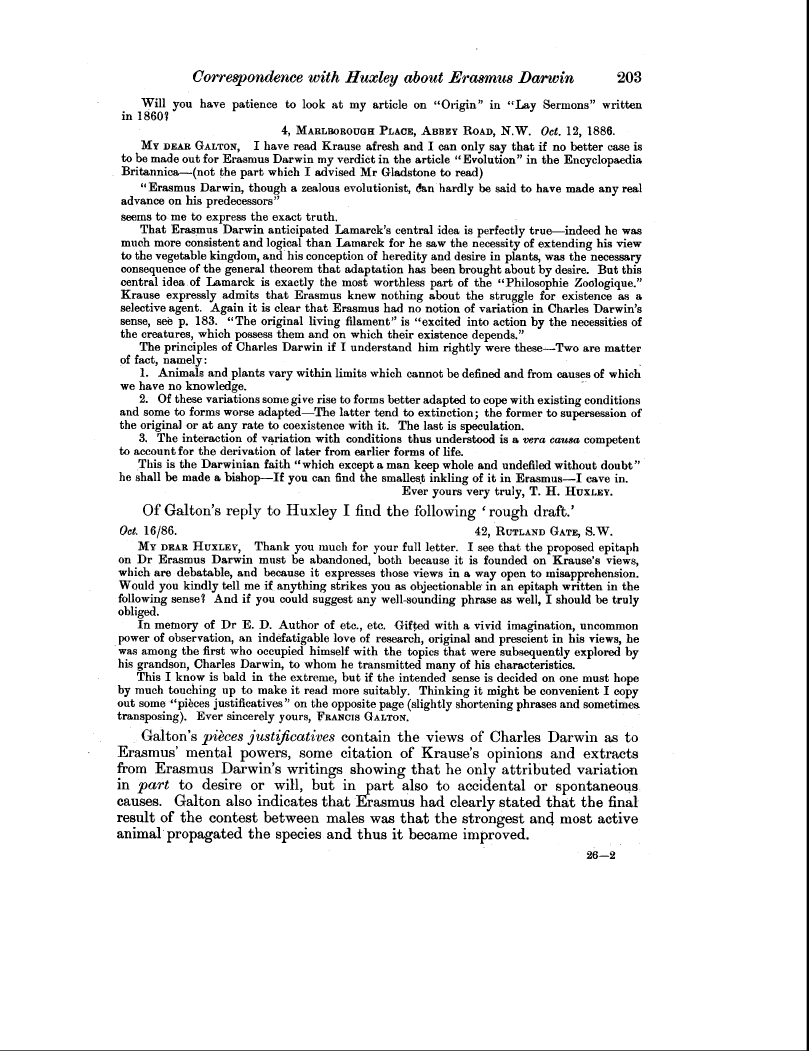Correspondence with Huxley about Erasmus Darwin 203
Will you have patience to look at my article on "Origin" in "Lay Sermons" written in 18604
4, MARLBOROUGH PLACE, ABBEY ROAD, N.W. Oct. 12, 1886.
MY DEAR GALTON, I have read Krause afresh and I can only say that if no better case is to be made out for Erasmus Darwin my verdict in the article "Evolution" in the Encyclopaedia Britannica-(not the part which I advised Mr Gladstone to read)
"Erasmus Darwin, though a zealous evolutionist, dan hardly be said to have made any real advance on his predecessors"
seems to me to express the exact truth.
That Erasmus Darwin anticipated Lamarck's central idea is perfectly true-indeed he was much more consistent and logical than Lamarck for he saw the necessity of extending his view to the vegetable kingdom, and his conception of heredity and desire in plants, was the necessary consequence of the general theorem that adaptation has been brought about by desire. But this central idea of Lamarck is exactly the most worthless part of the "Philosophie Zoologique." Krause expressly admits that Erasmus knew nothing about the struggle for existence as a selective agent. Again it is clear that Erasmus had no notion of variation in Charles Darwin's sense, see p. 183. "The original living filament" is "excited into action by the necessities of the creatures, which possess them and on which their existence depends."
The principles of Charles Darwin if I understand him rightly were these-Two are matter of fact, namely:
1. Animals and plants vary within limits which cannot be defined and from causes of which we have no knowledge.
2. Of these variations some give rise to forms better adapted to cope with existing conditions and some to forms worse adapted-The latter tend to extinction; the former to supersession of the original or at any rate to coexistence with it. The last is speculation.
3. The interaction of variation with conditions thus understood is a vera causa competent to account for the derivation of later from earlier forms of life.
This is the Darwinian faith "which except a man keep whole and undefiled without doubt" he shall be made a bishop-If you can find the smallest inkling of it in Erasmus-I cave in.
Ever yours very truly, T. H. HUXLEY.
Of Galton's reply to Huxley I find the following `rough draft.'
Oct. 16/86. 42, RUTLAND GATE, S.W.
MY DEAR HUXLEY, Thank you much for your full letter. I see that the proposed epitaph on Dr Erasmus Darwin must be abandoned, both because it is founded on Krause's views, which are debatable, and because it expresses those views in a way open to misapprehension. Would you kindly tell me if anything strikes you as objectionable' in an epitaph written in the following sense? And if you could suggest any well-sounding phrase as well, I should be truly obliged.
In memory of Dr E. D. Author of etc., etc. Gifted with a vivid imagination, uncommon power of observation, an indefatigable love of research, original and prescient in his views, he was among the first who occupied himself with the topics that were subsequently explored by his grandson, Charles Darwin, to whom he transmitted many of his characteristics.
This I know is bald in the extreme, but if the intended sense is decided on one must hope by much touching up to make it read more suitably. Thinking it might be convenient I copy out some "pieces justificatives" on the opposite page (slightly shortening phrases and sometimes transposing). Ever sincerely yours, FRANcis GALTON.
Galton's pieces justificatives contain the views of Charles Darwin as to Erasmus' mental powers, some citation of Krause's opinions and extracts from Erasmus Darwin's writings showing that he only attributed variation in part to desire or will, but in part also to accidental or spontaneous causes. Galton also indicates that Erasmus had clearly stated that the final result of the contest between males was that the strongest and most active animal propagated the species and thus it became improved.
26-2

